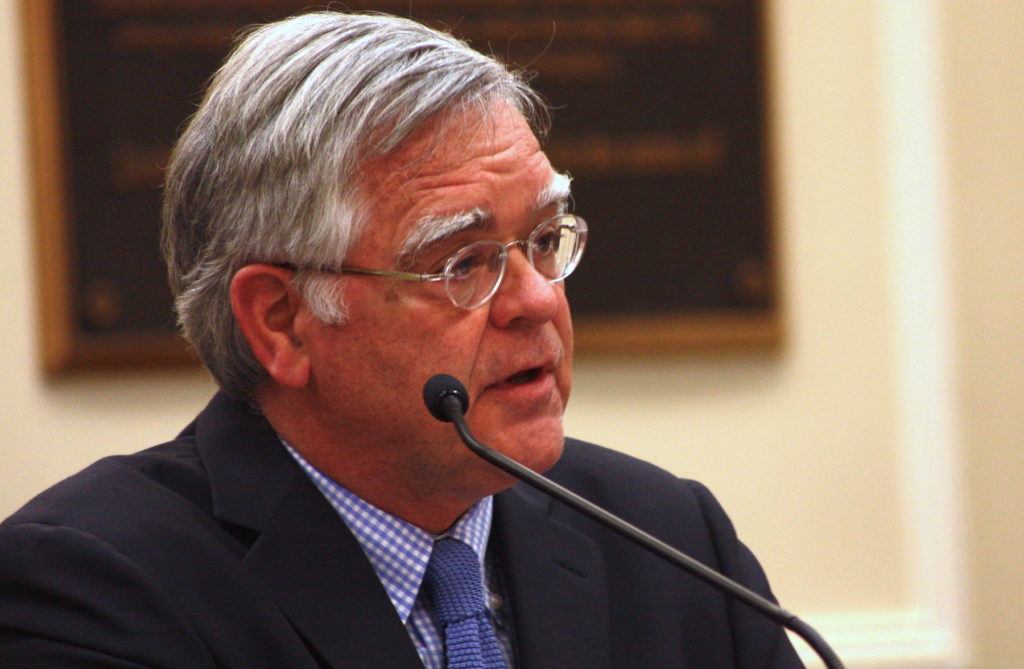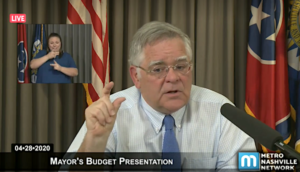
Nashvillians will likely pay more in taxes but get less in services from the Metro government this year.
City officials on Tuesday revealed their dramatic plan to stitch together a budget that is balanced — but one that reveals how recent years of shoestring budgeting left Nashville vulnerable to the twin disasters of a tornado and a global pandemic.
Mayor John Cooper’s proposed $2.447 billion spending plan, which is still subject to Metro Council revision, combines a massive amount of deferred spending and a substantial property tax rate increase of 32%.
For a typical Nashville household, where the median home value is about $277,000, the annual tax payment would rise from about $2,100 to $2,800, an increase of $700.
The proposal calls for a rate increase from $3.155 per hundred dollars of assessed value to $4.155. Metro’s tax bill calculator is online here.
The mayor also proposes:
- $234 million in cuts or deferred spending
- No pay increases for city employees; but few layoffs
- A 50% cut to discretionary spending, including reduced economic development grants, arts grants, and elimination of the Nashville Community Education Commission.
- Some replenishing of the city’s reserve fund
“This is a crisis budget. There is nothing discretionary in this budget. And as we go through it, we will see the severity of the actions that were taken to keep us together during this time of crisis,” Cooper said.
Cooper presented his proposed budget to the Metro Council on Tuesday afternoon. It will next undergo review by the council before being voted on in June. The mayor’s slideshow is available online as a PDF. A separate presentation by Metro Finance was also posted Tuesday.

This slide shows highlights of the actions being taken to balance Metro Nashville’s city budget.
The mayor characterized his plan as one of slowing down and trimming back. He said he is striving to keep education funding stable and to avoid deep cuts and staff layoffs.
Speaking to taxpayers, Cooper called the plan a “shared pain budget” for the city government and its residents.
Outlook Uncertain; Federal Aid Restricted
Metro Finance Director Kevin Crumbo said Tuesday that the financial situation could still worsen, since there’s uncertainty about the pace of recovery and the potential for a resurgence of the coronavirus in the fall or winter.
“But I’ve just got to hope along with so many other financial officers and economists that we’re going to see a trough here, if we haven’t already, in our economic activity and hopefully we’re going to build our way out of it at some pace,” he said.
Crumbo said the city calculated all its losses and needs before determining what level of tax increase would plug the budget gap. And he said the alternative would require mass furloughs or layoffs of Metro employees.
Among the important unknowns, he said, are where sales tax and hotel occupancy tax revenues will end up. He said it’s obvious that the tourism industry is hurting, but much more difficult to anticipate how and where residents are spending money.
Meanwhile, Metro Finance says it cannot rely on federal funds for normal budgeting, including $121 million from the CARES Act that was recently received.
Mary Jo Wiggins, deputy finance director, said guidelines restrict how that money is spent, mostly allotting it toward new and unexpected COVID-19 response efforts.
“We will seek maximum flexibility available,” she said, noting that more money is also available specifically for education, transit, housing and other areas.
Metro intends to audit the use of the CARES Act funds on a quarterly basis.
“There is no cavalry coming to the rescue,” the mayor said.
Budget Examination Begins
The Metro Council intends to question department leaders through a questionnaire and online-based meetings by mid-May, and to invite public comments on the budget on June 2 before revising and voting on the budget later in June.
But within hours of the mayor’s presentation, some on the council offered initial thoughts.
The Metro Council’s 11-member Minority Caucus had sharp words for how the mayor prepared and presented his proposal, saying it lacked “transparency and detail.”
In a news release, Councilmember Tanaka Vercher said the mayor should not expect that his proposal is a “done deal.”
“We need unprecedented collaboration and creativity,” she wrote.
The union for city employees said its members were already struggling before the pandemic, with the cost of living rising faster than salaries.
“For too many Metro employees, every year in Nashville has become a difficult year,” wrote Brad Rayson, president of SEIU Local 205.
Crisis Follows Tough Years
Metro’s budget challenges were already testing the city.
There were two years in a row of cuts, a rash of one-time asset sales and the cancellation of cost-of-living increases for city employees. At the same time, Metro has had a dwindling “rainy day” reserve fund and rising debt payments.
The past two years, the Metro Council considered rejecting the mayor’s budget to instead raise the property tax. But both efforts failed by narrow margins, setting up what was anticipated to be another council push for a tax increase this year.
The confluence of lingering problems then prompted the state comptroller to get involved, adding an additional layer of review and some pointed guidance about how the city would need to get its finances in order.
Then twin disasters struck in March: a deadly tornado and the coronavirus pandemic, which have forced officials to contemplate the sudden loss of what they now estimate at $472 million in tax revenues caused by the pandemic and $40 million in tornado recovery costs.
More: View all ongoing coverage of the Metro budget.
Since campaigning and winning office, Cooper has tended to resist the idea of raising taxes — while arguing at times that he never fully ruled out the possibility. That was despite the city having reached a historically low tax rate and scrambling in back-to-back years to balance its budget.
 Metro Nashville Network
Metro Nashville Network Mayor John Cooper presented his budget proposal in a livestream Tusday.
Cooper made strides in securing other forms of revenue, particularly from the thriving Convention Center Authority. And the Metro Council has studied and then increased several fees to bring in more dollars, such as parking tickets and an application related to sidewalk construction.
The mayor’s proposal also notes but does not detail increases to fire permits, and fees related to Metro Parks and Metro Codes.
But these measures, taken together, provide an estimated $64 million for Metro — far short of filling the financial hole.

